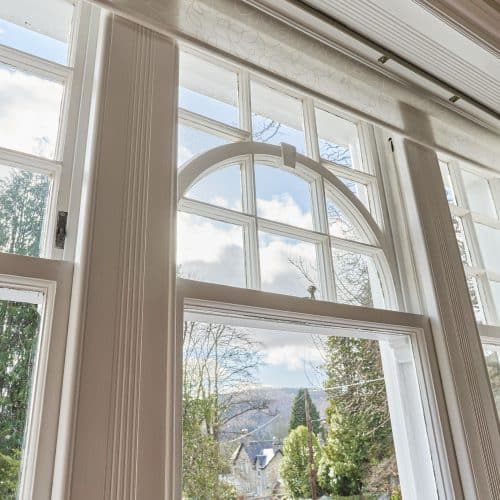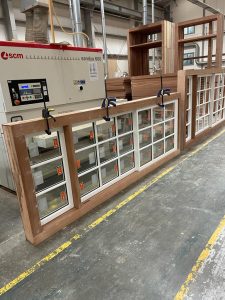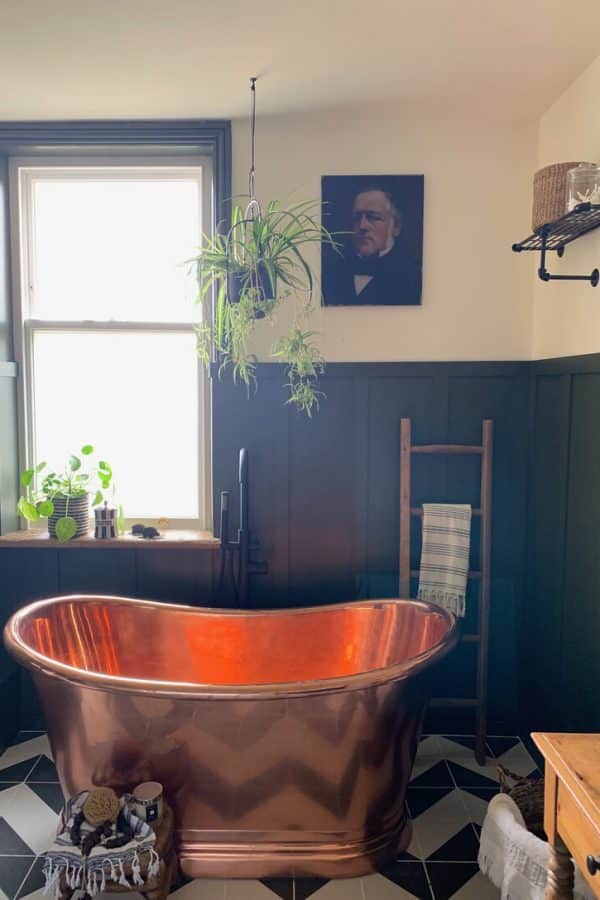The Advantages of Timber Framed Windows

Here at Ventrolla, we don’t sell uPVC windows. That’s because we believe timber-framed sash windows are by far the better option. They look great and are built using only the best materials and quality craftsmanship. But if you are still undecided on which to go for (uPVC or timber), let’s take a look at some of the advantages.
The advantages of timber-framed windows
The look
Timber-framed windows look fantastic. uPVC looks cheap and plastic. It’s such a visible part of your home, why scrimp money on something so important?
Long-lasting
Quality timber-framed windows are built to last. uPVC windows have an average life of 15–25 years. Ventrolla timer-framed new sash windows have a life span of 50-70 years. When you consider the life of the window, it’s easy to see which window offers the best savings over time.
Adds value to your property
If you do come to sell your home, timber-framed new sash windows make the property much more desirable. You may well find that the money you spend on the windows is more than covered by the increased house price.
Environmental impact
The last thing we need right now is more plastic in the world. uPVC is a pollutant that is difficult and expensive to recycle, so often ends up in landfill. Timber, on the other hand, will last for years and can be easily recycled.
Energy efficiency
Ventrolla timber-framed new sash windows have high-quality double-glazing and the unique VPSS to ensure maximum efficiency in your home.
Understanding Timber Framed Windows: A Comprehensive Guide
In the realm of architecture and home design, the choice of windows plays a crucial role in defining the aesthetic appeal and functionality of a space. One popular and timeless option is the timber-framed window, a design that seamlessly merges traditional craftsmanship with modern sensibilities. In this article, we delve into the intricacies of timber-framed windows, exploring their construction, benefits, and the diverse range of styles they offer.
What are Timber Framed Windows?
Timber-framed windows, also known as wooden-framed windows, are a type of window where the frame is constructed using timber, or wood, as the primary material. Timber-framed windows have a rich history and are renowned for their warmth, natural beauty, and versatility in design.
Construction and Components
Structural Integrity
Timber-framed windows consist of a robust structural framework crafted from timber. This frame supports the glass panes and provides the necessary strength and durability. The use of timber ensures a sturdy and long-lasting window structure.
Glazing Options
The glass panes in timber-framed windows come in various glazing options, including single, double, or even triple glazing. This versatility allows homeowners to choose windows based on their specific insulation and energy efficiency requirements.
Styles and Designs
Traditional Aesthetics
One of the distinct advantages of timber-framed windows is their ability to complement traditional architectural styles. The natural grain and texture of timber create a timeless aesthetic that harmonises with heritage homes and classic designs.
Contemporary Flair
In contrast, timber-framed windows are not confined to traditional settings. Many contemporary designs incorporate timber frames to add warmth and a touch of nature to modern, minimalist spaces.
Benefits of Timber Framed Windows
Thermal Efficiency
Timber has inherent insulating properties, making timber-framed windows excellent choices for maintaining a comfortable indoor temperature. This can result in energy savings by reducing the need for excessive heating or cooling.
Environmental Sustainability
Timber is a renewable resource, and responsible forestry practices ensure that the production of timber-framed windows has a minimal impact on the environment. Choosing timber-framed windows can be a sustainable choice for eco-conscious homeowners.
Customisation Options
Timber-framed windows offer a high degree of customisation. Homeowners can choose from various wood species, finishes, and hardware options, allowing for a bespoke window solution that aligns with the overall design vision.
Caring for Timber-Framed Windows
Regular Maintenance
To ensure the longevity of timber-framed windows, regular maintenance is essential. This may include repainting or resealing the frames to protect them from the elements and prevent decay.
Cleaning Tips
Cleaning timber-framed windows is a straightforward process. A mild detergent and water solution is usually sufficient, but it’s crucial to avoid abrasive cleaners that could damage the wood.
Timber-framed or wood-framed windows are the best
Timber-framed windows stand as a testament to the enduring appeal of natural materials in architecture. Whether seeking a window design that complements a historic residence or adds a touch of warmth to a contemporary space, the versatility and charm of timber-framed windows make them a timeless choice for homeowners. By understanding their construction, benefits, and maintenance requirements, individuals can make informed decisions when selecting windows that not only frame views but also contribute to the overall character of their homes.

Timber Framed Windows FAQ
1. What are timber-framed windows?
Timber-framed windows are windows whose frames are constructed using timber or wood. They are known for their natural beauty, versatility in design, and ability to complement both traditional and contemporary architectural styles.
2. What are the synonyms for timber-framed windows?
Synonyms include wooden-framed windows, wood-framed windows, and timber sash windows.
3. How are timber-framed windows constructed?
Timber-framed windows have a structural framework crafted from timber. This frame supports glass panes, and the windows can feature various glazing options, such as single, double, or triple glazing.
4. What Styles and Designs Do Timber-Framed Windows Come In?
Timber-framed windows can be tailored to traditional aesthetics, seamlessly fitting into heritage homes. They are also used in contemporary designs to add warmth and a touch of nature to modern, minimalist spaces.
5. What are the benefits of timber-framed windows?
- Thermal Efficiency: Timber’s insulating properties contribute to energy efficiency.
- Environmental Sustainability: Timber is a renewable resource, making these windows an eco-friendly choice.
- Customisation Options: Homeowners can choose from various wood species, finishes, and hardware options.
6. Are timber-framed windows energy-efficient?
Yes, timber-framed windows are known for their thermal efficiency, helping to maintain a comfortable indoor temperature and potentially reducing the need for excessive heating or cooling.
7. How Can I Maintain Timber-Framed Windows?
Regular maintenance is crucial. This may involve repainting or resealing the frames to protect them from the elements and prevent decay. Cleaning with a mild detergent and water solution is recommended.
8. Can timber-framed windows be used in modern homes?
Absolutely. Timber-framed windows are versatile and can be incorporated into modern homes, adding warmth and a natural element to contemporary designs.
9. Is timber a sustainable material for windows?
Yes, timber is a renewable resource. When sourced responsibly through sustainable forestry practices, timber-framed windows can be an environmentally friendly choice.
10. Can timber-framed windows be customised?
Yes, timber-framed windows offer a high degree of customization. Homeowners can choose from various wood species, finishes, and hardware options to create a bespoke window solution that aligns with their design preferences.
By addressing these frequently asked questions, homeowners and enthusiasts can gain a better understanding of the characteristics, advantages, and maintenance requirements of timber-framed windows.
If you’d like more information about the advantages of timber-framed windows please speak with our experts.

